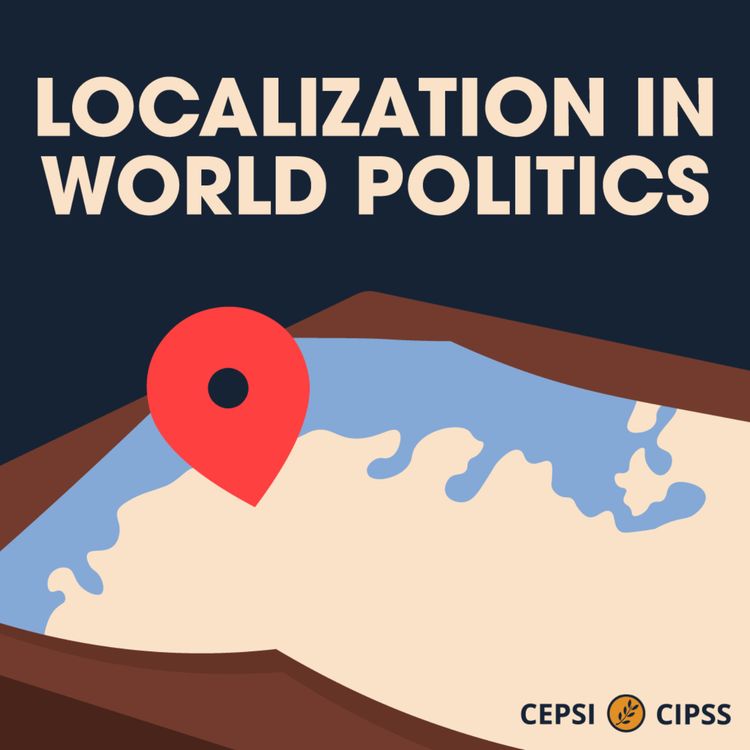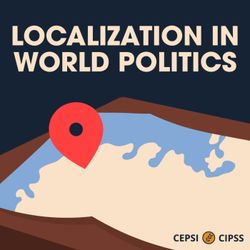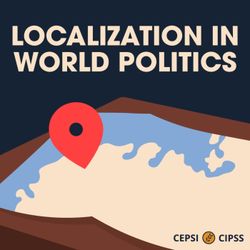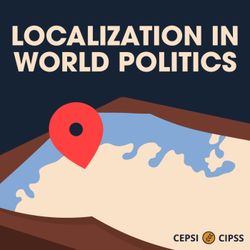Share

Localization in World Politics
"Localization as Self-Determination", with Hugo Slim
Ep. 3
•
In this third episode of Localization in World Politics, we are joined by Dr. Hugo Slim, senior research fellow at the las Casas Institute, Blackfriars Hall, University of Oxford, to discuss the history of localization, as well as the current and future challenges facing humanitarian organizations.
Host: Jennifer Welsh
Producer: Kareem Faraj
Theme Music: Nesterouk, Courtesy of Shutterstock, Inc.
Localization in World Politics is edited and produced in Montreal/Tiohtià:ke, on land which has long served as a site of meeting and exchange amongst Indigenous peoples, including the Haudenosaunee and Anishinabeg nations. We acknowledge and thank the diverse Indigenous peoples whose presence marks the territory from which we broadcast.
More episodes
View all episodes

10. Localization in Practice, with Marc Linning
19:44||Ep. 10In this tenth and final episode of Localization in World Politics, we are joined by Marc Linning, senior advisor on protection at the Center for Civilians in Conflict (CIVIC), to discuss how localization efforts have played out on the ground in the civilian protection work of CIVIC.Host: Emily ScottProducer: Kareem FarajTheme Music: Nesterouk, Courtesy of Shutterstock, Inc.Localization in World Politics is edited and produced in Montreal/Tiohtià:ke, on land which has long served as a site of meeting and exchange amongst Indigenous peoples, including the Haudenosaunee and Anishinabeg nations. We acknowledge and thank the diverse Indigenous peoples whose presence marks the territory from which we broadcast.
9. Can Digital Technologies Empower Local Communities? With Emily Paddon Rhoads and Oliver Kaplan
39:04||Ep. 9In this ninth episode of Localization in World Politics, we are joined by Emily Paddon Rhoads, Associate Professor of Political Science at Swarthmore College, and Oliver Kaplan, Associate Professor at the Josef Korbel School of International Studies at the University of Denver, to discuss how technology is transforming civilian self-protection practices in Syria and in Columbia. Host: Emily Scott Producer: Kareem Faraj Localization in World Politics is edited and produced in Montreal/Tiohtià:ke, on land which has long served as a site of meeting and exchange amongst Indigenous peoples, including the Haudenosaunee and Anishinabeg nations. We acknowledge and thank the diverse Indigenous peoples whose presence marks the territory from which we broadcast.
8. Looking for the Medusa in the Room, with Alex Hinton
42:51||Ep. 8In this eighth episode of Localization in World Politics, we are joined by Alex Hinton, Distinguished Professor of Anthropology at Rutgers University, UNESCO Chair on Genocide Prevention, and Director of the Center for the Study of Genocide and Human Rights, to discuss localization at the Khmer Rough Tribunal in Cambodia and what IR scholars can learn from anthropology.Book cover mentioned in episode: https://www.dukeupress.edu/man-or-monsterHost: Adam KochanskiProducer: Kareem FarajTheme Music: Nesterouk, Courtesy of Shutterstock, Inc.Localization in World Politics is edited and produced in Montreal/Tiohtià:ke, on land which has long served as a site of meeting and exchange amongst Indigenous peoples, including the Haudenosaunee and Anishinabeg nations. We acknowledge and thank the diverse Indigenous peoples who presence marks the territory from which we broadcast.
7. Localization, the Rule of Law, and the Post-Colonial Condition, with Mohamed Sesay
49:37||Ep. 7In this seventh episode of Localization in World Politics, we are joined by Mohamed Sesay, Assistant Professor in the Department of Social Science at York University, who uses a post-colonial lens to interrogate and question how rule of law norms are be instrumentalized by political elites in Africa, and how the application of “apolitical” liberal norms can be used to mask domination and hegemony. Host: Adam KochanskiProducer: Kareem FarajTheme Music: Nesterouk, Courtesy of Shutterstock, Inc.Localization in World Politics is edited and produced in Montreal/Tiohtià:ke, on land which has long served as a site of meeting and exchange amongst Indigenous peoples, including the Haudenosaunee and Anishinabeg nations. We acknowledge and thank the diverse Indigenous peoples whose presence marks the territory from which we broadcast.
6. Politicizing the Local, with Maha Shuayb
34:11||Ep. 6In this sixth episode of Localization in World Politics, we are joined by Maha Shuayb, British Academy Bilateral Chair in Conflict at the University of Cambridge, to discuss the limits of localization and the obstacles to achieving participatory approaches in the academic and humanitarian fields.Article mentioned: https://journals.sagepub.com/doi/full/10.1177/13505084211030646Host: Emily ScottProducer: Kareem FarajTheme Music: Nesterouk, Courtesy of Shutterstock, Inc.Localization in World Politics is edited and produced in Montreal/Tiohtià:ke, on land which has long served as a site of meeting and exchange amongst Indigenous peoples, including the Haudenosaunee and Anishinaabeg nations. We acknowledge and thank the diverse Indigenous peoples whose presence marks the territory from which we broadcast.
5. Bringing the Social into IR, with Ayse Zarakol
29:22||Ep. 5In this fifth episode of Localization in World Politics, we are joined by Ayse Zarakol, Professor of International Relations at the University of Cambridge, to discuss norm socialization, international stigmatization, and explore the Chinggisid model of sovereignty.Host: Jennifer WelshProducer: Kareem FarajTheme Music: Nesterouk, Courtesy of Shutterstock, Inc.Localization in World Politics is edited and produced in Montreal/Tiohtià:ke, on land which has long served as a site of meeting and exchange amongst Indigenous peoples, including the Haudenosaunee and Anishinaabeg nations. We acknowledge and thank the diverse Indigenous peoples whose presence marks the territory from which we broadcast.
4. Empire and Customization, with Andrew Phillips
27:22||Ep. 4In this fourth episode of Localization in World Politics, we are joined by Dr. Andrew Phillips, Associate Professor of International Relations and Strategy at the University of Queensland, to unpack the concept of customization: a reversal of localization where outside actors selectively adopt and appropriate local norms in the pursuit of imperial ends.Host: Adam KochanskiProducer: Kareem FarajTheme Music: Nesterouk, Courtesy of Shutterstock, Inc.Localization in World Politics is edited and produced in Montreal/Tiohtià:ke, on land which has long served as a site of meeting and exchange amongst Indigenous peoples, including the Haudenosaunee and Anishinabeg nations. We acknowledge and thank the diverse Indigenous peoples whose presence marks the territory from which we broadcast.
2. Why Study Localization in World Politics? with Jennifer Welsh
25:26||Ep. 2In this second inaugural episode of Localization in World Politics, we are joined by Dr. Jennifer Welsh, Canada 150 Research Chair in Global Governance and Security; Director of the Centre for International Peace and Security Studies (CIPSS) to discuss the genesis of the Localization in World Politics research project, its objectives, and expected contributions.Host: Adam KochanskiProducer: Kareem FarajTheme Music: Nesterouk, Courtesy of Shutterstock, Inc.Localization in World Politics is edited and produced in Montreal/Tiohtià:ke, on land which has long served as a site of meeting and exchange amongst Indigenous peoples, including the Haudenosaunee and Anishinabeg nations. We acknowledge and thank the diverse Indigenous peoples whose presence marks the territory from which we broadcast.